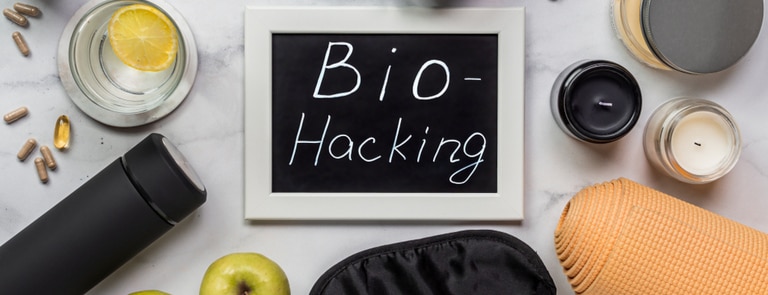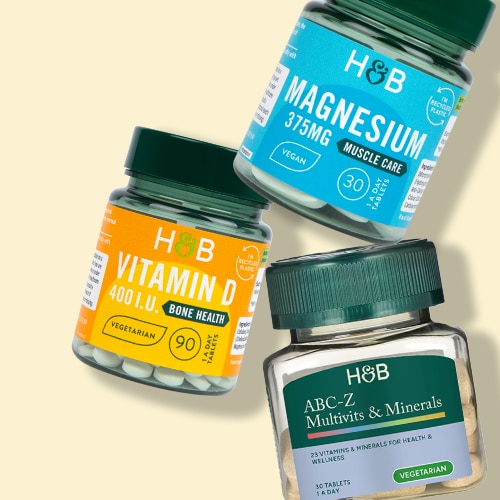15% off £25 or 20% off £35
Code:BASKET
Hyperhidrosis: what counts as excessive sweating?

Got sweaty armpits, clammy palms or a constant glistening shine that won’t quit? Let’s break down what counts as excessive sweating, what it's a sign of and how to keep it under control
Summary
1Why do we sweat?
With between two and four million sweat glands scattered all over your body, it's actually a vital part of how we keep cool...
2What counts as excessive sweating?
If you're wiping your palms every time you shake hands or changing your clothes multiple times a day even when the weather is mild...
3How can I stop excessive sweating?
There’s no magic cure but there are a number of products and strategies that can help with excessive sweating...
It’s a cool day, yet here you are, battling damp palms and a bead of sweat running down your forehead. What’s going on? If you're wondering why your sweat glands are suddenly working overtime, you're not alone.
Excessive sweating (aka hyperhidrosis) is more common than you'd think.1 But don’t panic – it’s not all doom and gloom. Let’s give a little love to sweat and take a breather while we look at what excessive sweating is a sign of and what counts as excessive sweating.
Why do we need to sweat?
Sweating might be an inconvenient, sticky mess but it's actually a vital part of how we keep cool.2 It’s our body’s way of cooling down to maintain a safe internal temperature.2 Think of sweat as your body's air conditioner, kicking in when things heat up. But it's not just about exercise or hot weather. Emotional triggers like stress and anxiety can also send your sweat glands into overdrive.3
With between two and four million sweat glands scattered all over your body,4 it’s no surprise that the process of sweating is a big deal. These glands are activated by your nervous system to help regulate temperature and handle the stress of emotions.5 So, when things heat up, your body sweats as a natural response to balance out the increase in temperature.
What happens when your body gets too hot?
- Temperature receptors in your skin sense the rise in temperature and signal your brain’s hypothalamus (your body’s clever thermostat)6
- If you’re too warm, the hypothalamus sends a signal to your skin to start the cooling process6
- Sweat glands are triggered to release sweat. As sweat evaporates, it cools the skin down5
- Once your body returns to its normal temperature, sweating stops
What counts as excessive sweating?
So you’re looking around a gym class and thinking, “Am I sweating way more than everyone else?” or “Why do I keep getting body odour?”. While it’s common to sweat more during physical activity, some people sweat a lot more than others4 – and that's okay. It could just be how your body reacts to exercise.
However, if you feel like you’re sweating excessively even when you’re not exerting yourself, it may point to something else and it’s best to speak to your GP.
Hyperhidrosis is about sweating for no good reason.1 For instance, if you're wiping your palms every time you shake hands or changing your clothes multiple times a day even when the weather is mild, you might be dealing with hyperhidrosis.

Why do we sweat?
Unfortunately, there’s no one-size-fits-all answer. Hyperhidrosis can be broken down into two main types:
What’s primary focal hyperhidrosis?
This type affects about three in 100 people7 and involves overactive sweat glands in specific areas of the body, like the palms, feet or underarms. The kicker? There’s no underlying medical condition causing the sweating and it’s not triggered by medication. It’s just your body’s unique reaction. You’ll sweat normally everywhere else and it usually starts in childhood or adolescence.7
Symptoms of primary focal hyperhidrosis:7
- sweating only in certain areas (like palms, armpits and feet)
- no underlying medical condition or medication involved1
- happens at least once a week1
- family history of sweating issues1
What’s secondary generalised hyperhidrosis?
This type is less common but involves sweating all over the body, and it’s often caused by an underlying medical condition or medication.8 If you sweat excessively at night or your sweating begins in adulthood, this might be the case.
Symptoms of secondary generalised hyperhidrosis:8
- sweating affects larger areas of your body
- can be caused by medical conditions or medications
- sweating often occurs at night
How can I stop excessive sweating?
Here’s the good news: while there’s no magic solution for excessive sweating, there are plenty of products and strategies to help you minimise the embarrassment. Here’s some tips to follow:
- for underarm sweating: try switching to antiperspirants that contain aluminium salts, which help block sweat.9 Sometimes regular deodorants only mask body odour but won’t stop sweating
- choose breathable fabrics: steer clear of tight, man-made materials like Lycra and nylon. Instead, opt for clothes that let your skin breathe and help absorb moisture
- choose the colour of your clothes wisely: dark and white clothes can hide sweat patches better than lighter colours
- if you have sweaty feet: change your socks frequently – maybe even twice a day to keep things fresh. Also try foot deo spray or powder to help absorb sweat
- avoid trigger foods: spicy foods can heat up your body and prompt sweating so try to keep them to a minimum
- stay hydrated: drinking water helps keep your body cool and prevents it from sweating unnecessarily
How to stop sweating on your face
This one’s tricky, as it’s a natural process your body goes through to cool you down. A couple of things that might be able to help are:
- facial antiperspirants: look for ingredients like salicylic acid and aluminium chloride. Even better if you use it overnight as this is when your sweat reduces and can remain on your face before being washed off9
- topical anticholinergics: a medication you can get in the form of gel, cream or pads. These may cause irritation, so it’s always best to speak to a healthcare professional first to check they’re right for you10
The final say
Excessive sweating might be more about genetics than a health issue, but that doesn’t mean you have to accept it. From picking an antiperspirant to rotating your shoes, there’s plenty of ways to beat the sweat and avoid awkward moments.
If it’s seriously getting in the way of your everyday life, don't hesitate to talk to a pro. You'll sweat less and feel more confident in no time.
This article provides informational advice and is not a substitute for medical care. Curated by experts for accuracy, we take great care to ensure the information is up-to-date and relevant. However, you should always consult your GP or healthcare professional before using supplements or alternative products, particularly if you have medical conditions or are under supervision.
1. NHS. Excessive sweating (hyperhidrosis) [Internet]. nhs.uk. 2017. Available from: https://www.nhs.uk/conditions/excessive-sweating-hyperhidrosis/
2. Gagnon D, Crandall CG. Sweating as a Heat Loss Thermoeffector. Handbook of Clinical Neurology [Internet]. 2018;156(1):211–32. Available from: https://www.ncbi.nlm.nih.gov/pubmed/30454591
3. Harker M. Psychological Sweating: A Systematic Review Focused on Aetiology and Cutaneous Response. Skin Pharmacology and Physiology. 2013;26(2):92–100.
4. Baker LB. Physiology of Sweat Gland function: the Roles of Sweating and Sweat Composition in Human Health. Temperature [Internet]. 2019 Jul 3;6(3):211–59. Available from: https://www.ncbi.nlm.nih.gov/pmc/articles/PMC6773238/
5. Hodge BD, Brodell RT. Anatomy, Skin Sweat Glands [Internet]. Nih.gov. StatPearls Publishing; 2019. Available from: https://www.ncbi.nlm.nih.gov/books/NBK482278/
6. Osilla EV, Marsidi JL, Shumway KR, Sharma S. Physiology, temperature regulation [Internet]. National Library of Medicine. StatPearls Publishing; 2023. Available from: https://www.ncbi.nlm.nih.gov/books/NBK507838/
7. Hyperhidrosis [Internet]. www.nhsinform.scot. Available from: https://www.nhsinform.scot/illnesses-and-conditions/skin-hair-and-nails/hyperhidrosis/
8. Brackenrich J, Fagg C. Hyperhidrosis [Internet]. PubMed. Treasure Island (FL): StatPearls Publishing; 2020. Available from: https://www.ncbi.nlm.nih.gov/books/NBK459227/
9. Welzel J, Grüdl S, Welss T, Claas M, Sättler A, Förster T, et al. Quantitative ion determination in eccrine sweat gland cells correlates to sweat reduction of antiperspirant actives. International Journal of Cosmetic Science. 2021 Jan;43(2):181–90.
10. Dunford L, Clifton AV, Stephenson J, Radley K, McDonald L, Fretwell L, et al. Interventions for hyperhidrosis. Cochrane Database of Systematic Reviews. 2022 Feb 14;2022(2).











